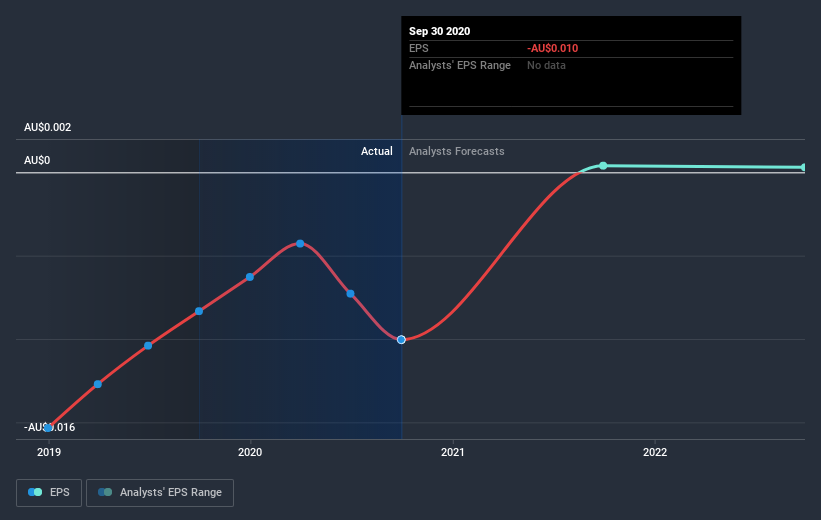Pilot Energy Limited (ASX:PGY) On The Verge Of Breaking Even
We feel now is a pretty good time to analyse Pilot Energy Limited's (ASX:PGY) business as it appears the company may be on the cusp of a considerable accomplishment. Pilot Energy Limited engages in the acquisition, exploration, and development of conventional oil and gas assets in Australia. On 30 September 2020, the AU$4.4m market-cap company posted a loss of AU$889k for its most recent financial year. The most pressing concern for investors is Pilot Energy's path to profitability – when will it breakeven? In this article, we will touch on the expectations for the company's growth and when analysts expect it to become profitable.
See our latest analysis for Pilot Energy
According to some industry analysts covering Pilot Energy, breakeven is near. They expect the company to post a final loss in 2020, before turning a profit of AU$145k in 2021. Therefore, the company is expected to breakeven roughly 12 months from now or less. How fast will the company have to grow to reach the consensus forecasts that anticipate breakeven by 2021? Working backwards from analyst estimates, it turns out that they expect the company to grow 131% year-on-year, on average, which is extremely buoyant. If this rate turns out to be too aggressive, the company may become profitable much later than analysts predict.
Underlying developments driving Pilot Energy's growth isn’t the focus of this broad overview, though, bear in mind that typically an energy business has lumpy cash flows which are contingent on the natural resource and stage at which the company is operating. This means that a high growth rate is not unusual, especially if the company is currently in an investment period.
Before we wrap up, there’s one issue worth mentioning. Pilot Energy currently has negative equity on its balance sheet. This can sometimes arise from accounting methods used to deal with accumulated losses from prior years, which are viewed as liabilities carried forward until it cancels out in the future. These losses tend to occur only on paper, however, in other cases it can be forewarning.
Next Steps:
This article is not intended to be a comprehensive analysis on Pilot Energy, so if you are interested in understanding the company at a deeper level, take a look at Pilot Energy's company page on Simply Wall St. We've also compiled a list of pertinent aspects you should further examine:
Historical Track Record: What has Pilot Energy's performance been like over the past? Go into more detail in the past track record analysis and take a look at the free visual representations of our analysis for more clarity.
Management Team: An experienced management team on the helm increases our confidence in the business – take a look at who sits on Pilot Energy's board and the CEO’s background.
Other High-Performing Stocks: Are there other stocks that provide better prospects with proven track records? Explore our free list of these great stocks here.
This article by Simply Wall St is general in nature. It does not constitute a recommendation to buy or sell any stock, and does not take account of your objectives, or your financial situation. We aim to bring you long-term focused analysis driven by fundamental data. Note that our analysis may not factor in the latest price-sensitive company announcements or qualitative material. Simply Wall St has no position in any stocks mentioned.
Have feedback on this article? Concerned about the content? Get in touch with us directly. Alternatively, email editorial-team@simplywallst.com.

 Yahoo Finance
Yahoo Finance 
